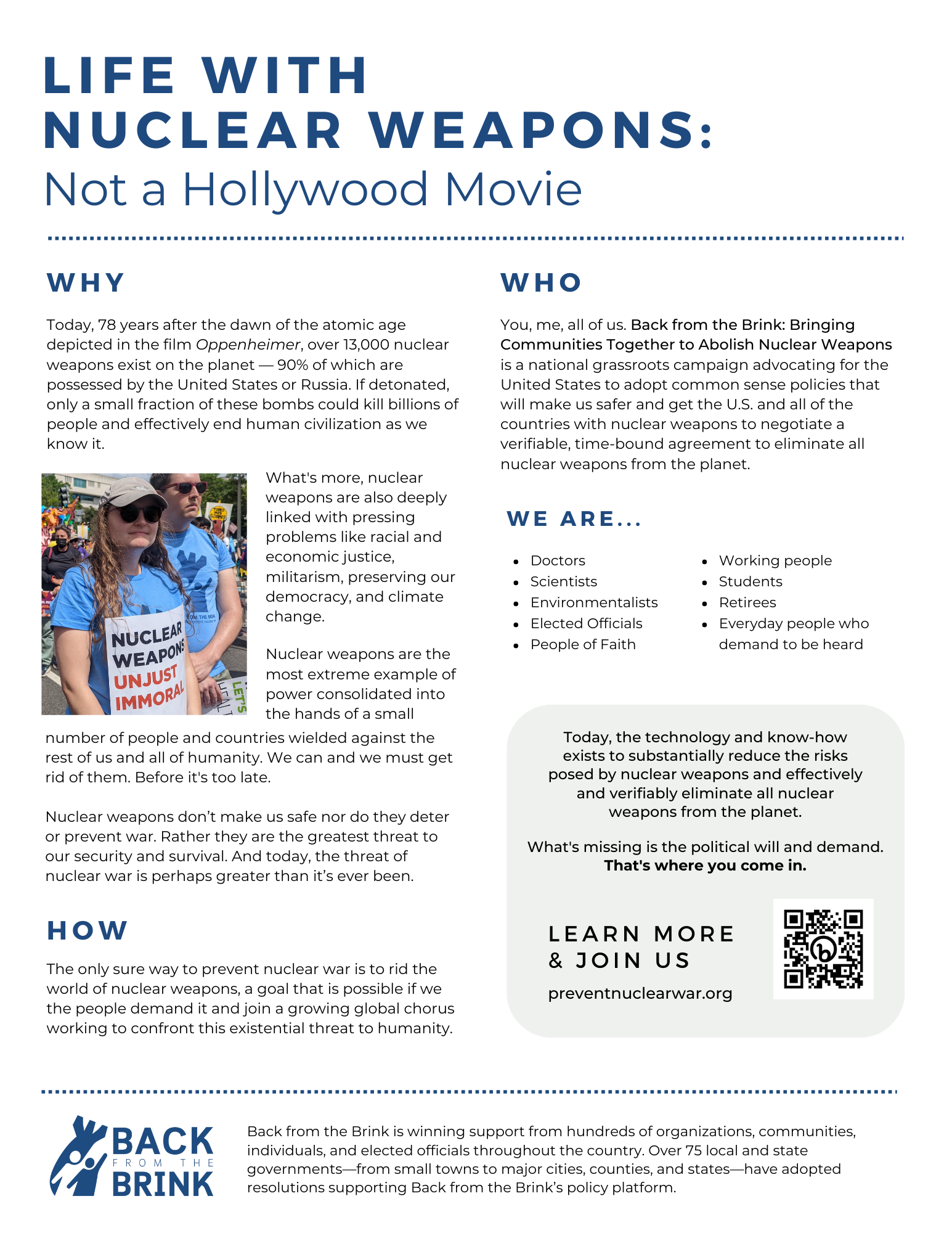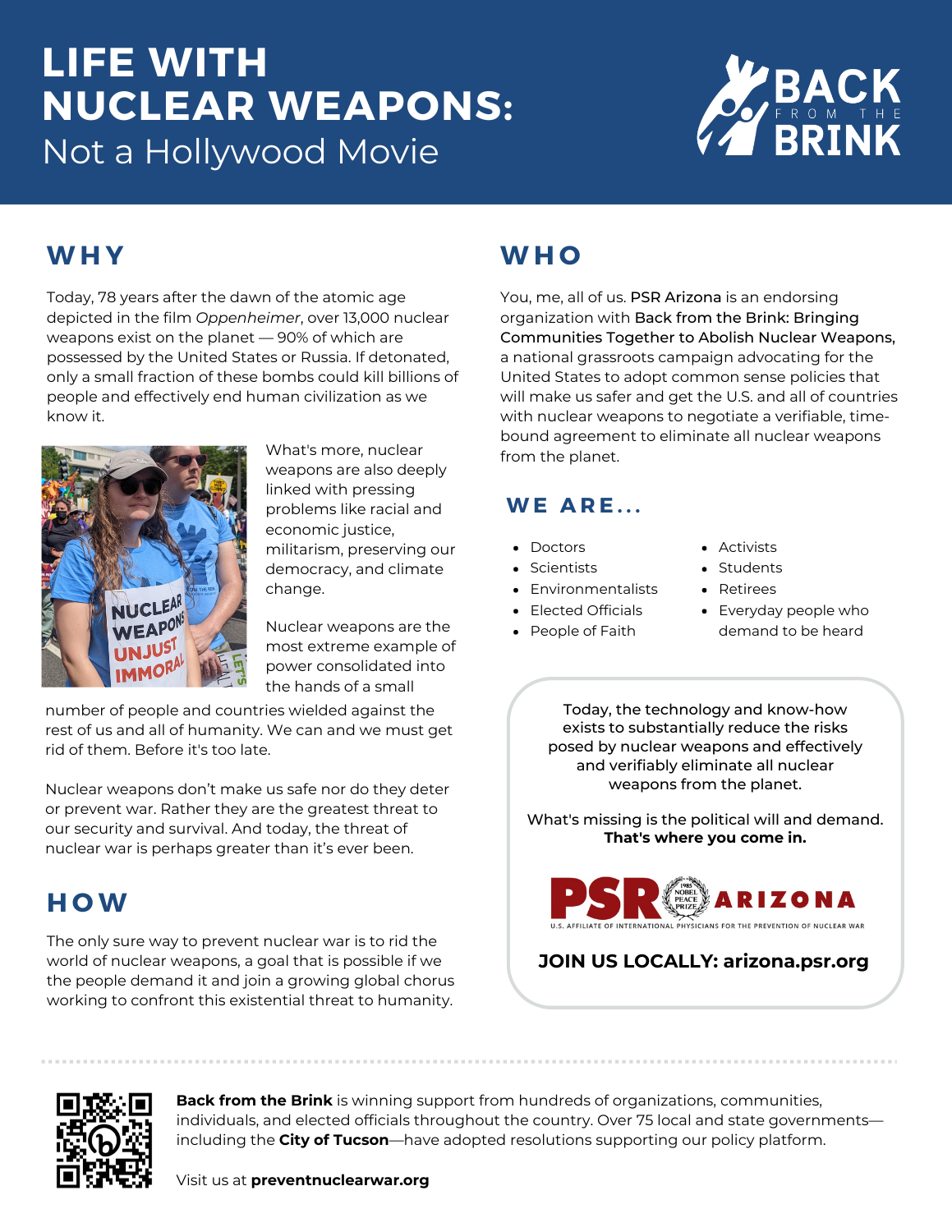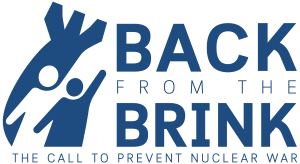“Oppenheimer” Advocacy Resources
 The Christopher Nolan film Oppenheimer debuted on July 21, 2023, one week after the 78th anniversary of the first-ever detonation of a nuclear bomb over Alamogordo, New Mexico. The film is based on the book “American Prometheus: The Triumph and Tragedy of J. Robert Oppenheimer” by Martin Sherwin and Kai Bird. J. Robert Oppenheimer was an American physicist who was instrumental in creating the atomic bomb.
The Christopher Nolan film Oppenheimer debuted on July 21, 2023, one week after the 78th anniversary of the first-ever detonation of a nuclear bomb over Alamogordo, New Mexico. The film is based on the book “American Prometheus: The Triumph and Tragedy of J. Robert Oppenheimer” by Martin Sherwin and Kai Bird. J. Robert Oppenheimer was an American physicist who was instrumental in creating the atomic bomb.
With film awards season upon us, Oppenheimer is once again in the spotlight. The film provides an important opportunity to educate the public about the danger that nuclear weapons pose to humanity and all we hold dear, from the environmental health and justice aspects of nuclear weapons production and testing to the real and growing threat of nuclear war. Importantly, Oppenheimer also provides an opportunity to engage your community in efforts to abolish nuclear weapons and enact Back from the Brink’s common sense policies to reduce the risk of nuclear war.
Below are advocacy resources, actions you can take, and materials to share with your community. If you haven’t already, be sure to sign up for Back from the Brink emails for news, updates, and advocacy opportunities.
Engage Local Media
Help downwinders & frontline communities
Pass a Local Resolution
Urge Your U.S. House rep to Cosponsor H. Res. 77
Engage Local Media
A key message to convey is that this movie should serve as an educational opportunity for folks in the community to both learn about the real risks posed by nuclear weapons and how each of us can help reduce those risks by getting involved through Back from the Brink. You should first find out what the submission guidelines are for letters to the editor and op-eds and guest commentary, particularly the maximum word count that is allowed. You should plan to convey no more than 2-3 key messages. Some helpful resources include Tips for Writing and Getting Your Letter Published by the Union of Concerned Scientists and Tips from Writing and Placing Letters to the Editor and Understanding News Values from ReThink Media. BftB and ReThink Media can serve as a valuable resources for local media, including by providing recommendations for experts and campaign spokespeople to be interviewed.
Here are some suggested hooks and messages you might wish to convey in your letter or op-ed or when talking to or being interviewed by local journalists/media outlets—keeping in mind that it’s always important to speak with your own voice.
- The film, Oppenheimer, is more than blockbuster special effects entertainment and Hollywood story telling. It’s a chance to stimulate honest discussion in our community and country about the existential threat to humanity posed by nuclear weapons which began 78 years ago in the desert of New Mexico.
- The film is a lesson in what is possible when smart, committed people act. And today if smart, committed people act it is both possible and practicable to eliminate nuclear weapons and this unacceptable threat to our future and all we hold dear.
- The people living near the Trinity nuclear test site in New Mexico in 1945 were the first of many victims of the testing, production, and use of nuclear weapons — harm being felt every day, particularly by indigenous and low income communities near testing, production and nuclear waste sites.
- The U.S. atomic bombings of Hiroshima and Nagasaki, Japan three weeks after the Trinity test killed an estimated 210,000 people, with thousands more suffering from leukemia, cancer, and other illnesses due to radiation exposure.
- Recent scientific studies have determined that just a small fraction of the world’s 13,000+ nuclear weapons were detonated, billions of people could perish. A large-scale nuclear conflict between the US and Russia could kill ¾ of the world’s people.
- During this time of war and heightened global tensions it is critical that the United States, Russia and China talk to each other and engage in diplomacy and recognize the world’s collective self interest in preventing a catastrophic nuclear war that could threaten all of humanity.
- At the height of the Cold War and heightened tensions in the 1980s, President Reagan and Soviet leader Mikhail Gorbachev engaged in diplomacy and negotiated significant nuclear arms control agreements.
- Nuclear weapons are deeply unjust. They are the most extreme example of power consolidated into the hands of a small number of people and countries wielded against all of humanity — present and future.
- All of us deserve to be safe and to have a voice in decisions affecting our safety and security, and our children’s futures. Current dangerous, unnecessary U.S. nuclear weapons policies, such as the one that gives sole decision making authority to the U.S. president, will only change if we the people demand such change from Washington decision makers, including our very own members of Congress.
- Nuclear weapons are very much a local issue and everyone’s concern — the tens of billions of dollars spent annually to build and maintain them rob our communities of tax dollars and resources we need to address real security concerns like gun violence, racism, poverty, and inadequate housing and healthcare.
- All of us can get involved, speak out and join with others right here in our community through the national grassroots nuclear disarmament campaign, Back from the Brink, see www.preventnuclearwar.org.
Background Materials
 For further reading about Oppenheimer, the man, the movie, and his legacy explore this new special issue of the Bulletin of the Atomic Scientists.
For further reading about Oppenheimer, the man, the movie, and his legacy explore this new special issue of the Bulletin of the Atomic Scientists.
In it you’ll find:
- An interview with Christopher Nolan, director of Oppenheimer (link)
- An interview with Kai Bird, co-author of American Prometheus (the book which the movie is based on) (link)
- An essay by psychiatrist Robert Jay Lifton, “Oppenheimer’s tragedy—and ours” (link)
- Memories of Oppie, from a Manhattan Project physicist (link)
- A new reported feature on Downwinders, “Collateral damage: American civilian survivors of the 1945 Trinity test” (link)
- An archival piece from 1995 by Hideko Tamura Friedman about her memories being a 10-year-old in Hiroshima (link)
- An archival piece from 1975 by Kenneth Bainbridge a Los Alamos scientist about being a part of the Trinity Test (link)
- Because the movie deals heavily with Oppenheimer’s security clearance hearing there is also a collection of materials that addresses that directly
- A 1953 piece from Major General K. D. Nichols presenting the charges against Oppenheimer (link)
- Oppenheimer’s reply (link)
- A 1977 reexamining of the case from a former Atomic Energy Commission legal officer (link)
- A statement from the Bulletin earlier this year after the Dept of Energy vacated the 1954 decision (link)
- A new essay from renewable energy scientist Dan Kammen about his own resignation from the Trump Administration and what lesson he took from Oppenheimer’s experience on the intersection of science and public service (link)
Post messages about Oppenheimer, H. Res. 77, and the need for congressional leadership on nuclear disarmament on your social media channels. (Note: Local organizations should tag their House members.) Here’s where you can find their Twitter handles.
Twitter (must be 280 characters or less)
- Awards season has brought @OppenheimerFilm back into the spotlight, which gave us a chance to understand & discuss the dangers of #nuclearweapons. If you feel motivated to get rid of this existential threat, join the national @BackfromtheBrink campaign: https://bit.ly/bftbadvocacy
- Did you watch @OppenheimerFilm and wonder what you can do about the threat of #nuclearweapons? @BackfromBrink is a national grassroots movement working to eliminate them. Get involved today: https://preventnuclearwar.org/
- Awards season has brought @OppenheimerMovie back into the spotlight, which gave us a chance to learn more about and discuss the vast dangers of nuclear weapons. If you feel motivated to get rid of this existential threat, join the national @PreventNuclearWar campaign today: https://bit.ly/bftbadvocacy
- Did you watch @OppenheimerMovie and wonder what you can do about the threat of nuclear weapons? @PreventNuclearWar is a national grassroots movement working to eliminate them. Get involved today: https://preventnuclearwar.org/
Oppenheimer Flyer
Back from the Brink has created flyers that can be downloaded below and distributed to Oppenheimer moviegoers. If you would like your organization’s name and contact information on the flyer, please fill out our collateral request form and we will create a custom version for you to print locally or at home. Please make sure to be in touch with theatres and/or your town or city’s rules regarding leafletting on private or public property, and please be be respectful and courteous as you engage with members of the public. You can find locations where the film is playing here.
Help downwinders and frontline nuclear communities
A central tenet of U.S. nuclear weapons policy since the dawn of the atomic age and the July 16, 1945 Trinity test has been to ignore and neglect the countless individuals and communities harmed by the extraction, production, testing, clean-up, and storage of nuclear materials and weapons.
According Tina Cordova, founder of the Tularosa Basin Downwinders Consortium, which has worked tirelessly for decades to secure justice for the victims (and their ancestors) of the Trinity test, “the government didn’t warn or evacuate the estimated tens of thousands of people living within a 50-mile radius of the Trinity Test blast. The detonation produced more heat and light than the sun, generating radioactive ash that fell for days. The communities downwind of the blast saw a spike in infant deaths in the months after the explosion and, generations later, continue to suffer its effects. The government basically walked away from the people of New Mexico and has taken no responsibility for all the sacrifice, suffering, and the dying.”
As we campaign to abolish nuclear weapons it is critical that we continue to seek recognition, justice, and compensation for nuclear frontline communities, to support their efforts and give voice to their struggles. To learn more and connect with these communities the following resources may be helpful:
Tularosa Basin Downwinders Consortium
Alliance for Nuclear Accountability
Union of Concerned Scientists Explainer – What Are Nuclear Frontline Communities
Oppenheimer—And the Other Side of the Story by Tewa Women United
Press the Button Podcast Interview with Tina Cordova, Tularosa Basin Downwinders Consortium
First We Bombed New Mexico is a documentary about “Trinity,” the world’s first nuclear bomb detonated in New Mexico one month before the bombing of Hiroshima.
Pass a local resolution
The Oppenheimer film is also an opportunity to organize a resolution effort for your town, city, county or state and include support for H. Res. 77 in the resolution. Resolutions are excellent public awareness, engagement, and advocacy vehicles, and can be an impactful way to demonstrate to your federal representatives that their constituents want them to take action on nuclear abolition. More than 75 municipalities and state legislative bodies have passed Back from the Brink resolutions or proclamations already.
Here’s a sample resolution that you can customize for your community, and here is Back from the Brink’s Guide to Resolutions and Proclamations for more information on how to pass a local resolution. As always, we encourage you to reach out to us for support.
Urge Your Congress Member to cosponsor H. Res. 77
H. Res. 77 is a resolution introduced in the U.S. House of Representatives by Rep. Jim McGovern (D-MA) and Rep. Earl Blumenauer (D-OR) in January 2023 that calls on the United States to embrace the goals and provisions of the Treaty on the Prohibition of Nuclear Weapons (TPNW) and to adopt Back from the Brink’s comprehensive policy prescriptions for preventing nuclear war. Back from the Brink is all in on using H. Res. 77 as a vehicle for transformative change—as a grassroots organizing and advocacy tool to stimulate real debate about nuclear weapons in communities around the country and for cultivating congressional leaders committed to advancing the cause of nuclear disarmament. Please visit our H. Res. 77 Advocacy Resources page and take action!






Share on Social Media